Cloud Feeder
Oracle Marketing Cloud - Eloqua Channel App
App Configuration
Step 1: Add the Cloud Feeder
Within the Eloqua Campaign Canvas or Program Canvas, find the Eventbrite Feeder in the Data Sources menu area. Double-click on or drag the Eventbrite Feeder onto your canvas workspace.
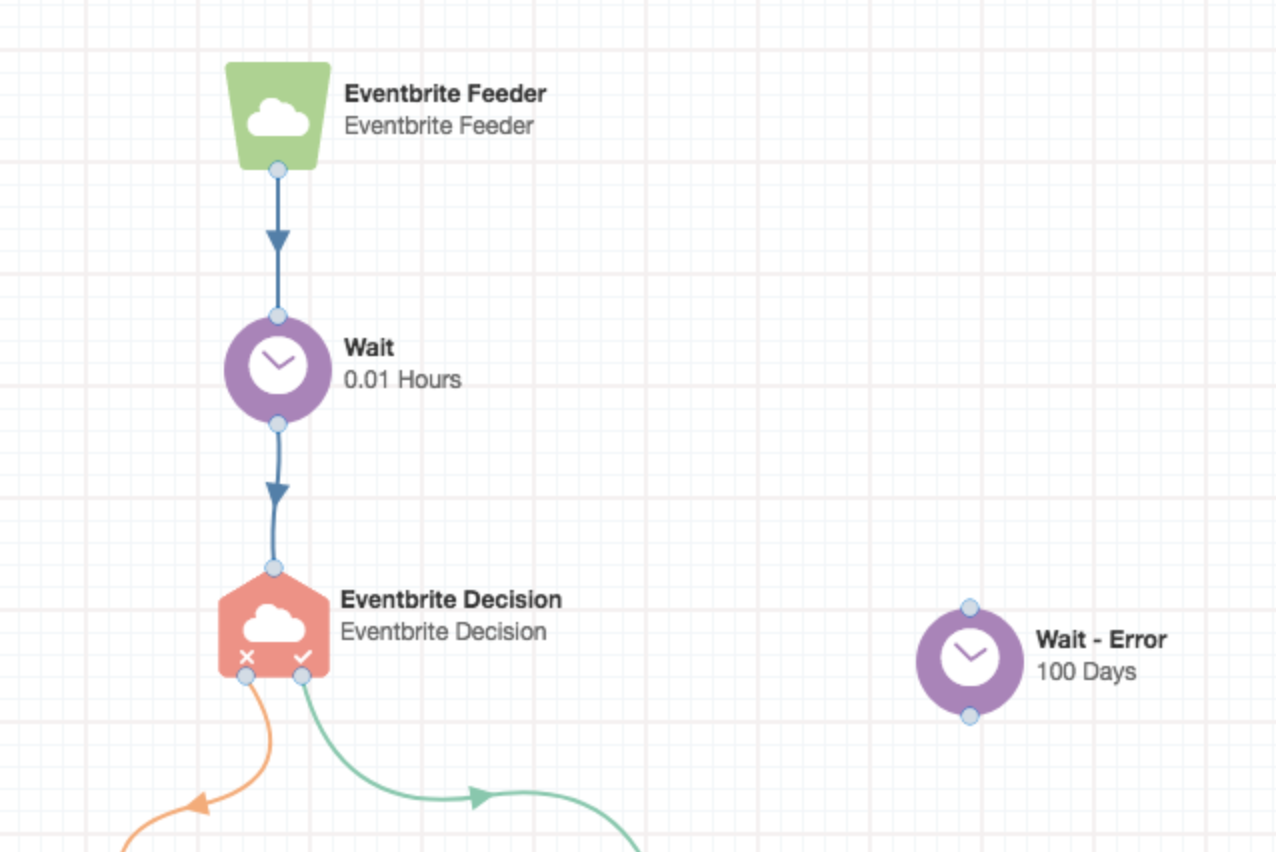
Step 2: Select Eventbrite Event
To begin configuration of the app, double-click on the app step on the canvas. When you click on the configuration button (:fa-pencil:), a new frame will open with configuration settings. Select your desired Eventbrite event from the dropdown list.

By default, all attendees for the selected Eventbrite event will be added to your Campaign or Program. Optionally, you can filter the desired attendees by check-in, cancellation, and refund statuses.
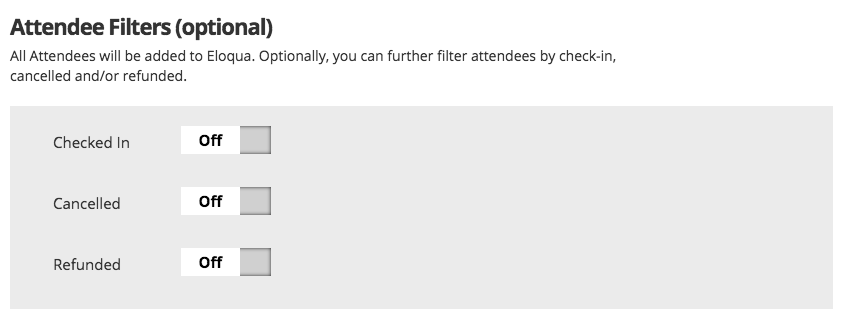
You have the option to feed data from Eventbrite into Eloqua once or on a continuous basis. If the ongoing import setting is enabled, the app will check Eventbrite every few minutes, for new and updated records that meet your criteria, if the Campaign or Program is active.

Step 3: Map To Your Eloqua Contact Fields
Map the standard and custom data available in Eventbrite, as well as static fields, to your Eloqua Contact fields. Simply drag the desired source field to its target. Remove a mapping by dragging a mapped target field to the left.
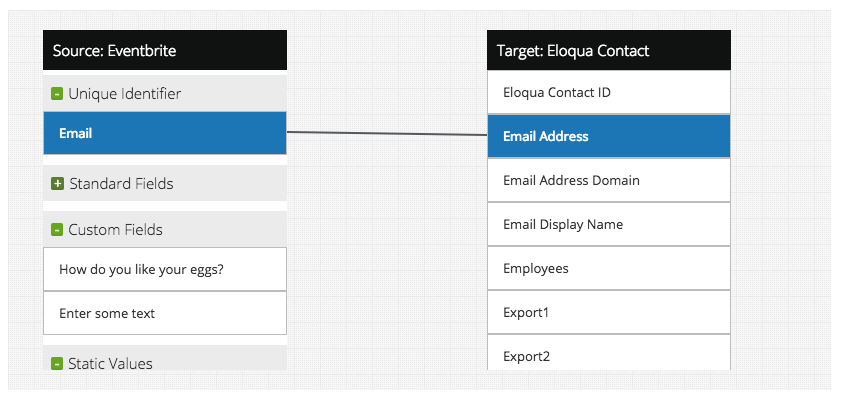
The Eventbrite feeder allows the following fields for Contact import:
- Unique Identifier - Email used as the default unique identifier for an Eloqua Contact feeder
- Standard Fields - The following event attendee standard fields are available:
- Attendee ID
- Event ID
- Checked In
- Cancelled
- Refunded
- First Name
- Last Name
- Billing Address 1
- Billing Address 2
- Billing City
- Billing State
- Billing Postal Code
- Billing Country
- Billing Region
- Custom Fields - Any event custom field (question) is available for mapping
- Static Values - You can add one or multiple static fields for mapping
Optionally, you can change the update rule to be applied when the data is imported from Eventbrite to Eloqua.

Note: “Always Update Eloqua” is the default.
Since the same Eventbrite attendee, by email address, can be associated an event more than once, you will need to decide which record should be imported by selecting a Dedupe Rule.

Step 4: Create Eloqua Custom Object Records (optional)
Optionally, you can import data from Evenbrite into an Eloqua Custom Object. To do so, select your Custom Object, and the field on the Custom Object and Eventbrite that should be used for matching. This might be the attendee email address if you have one event attendee record per Eloqua Contact or the Attendee ID if you have many attendee records connected to a single Eloqua Contact.

Under “Import Settings”, set your preferences for how you would like Custom Object records to be linked to an Eloqua Contact or Account record.
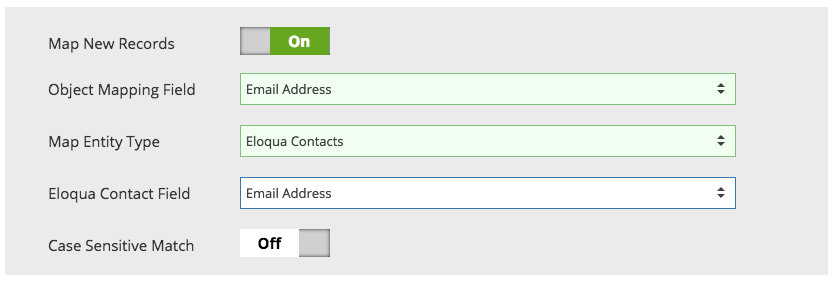
Under “Field Mapping”, map the standard and custom data available in Eventbrite to your preferred Custom Object fields.
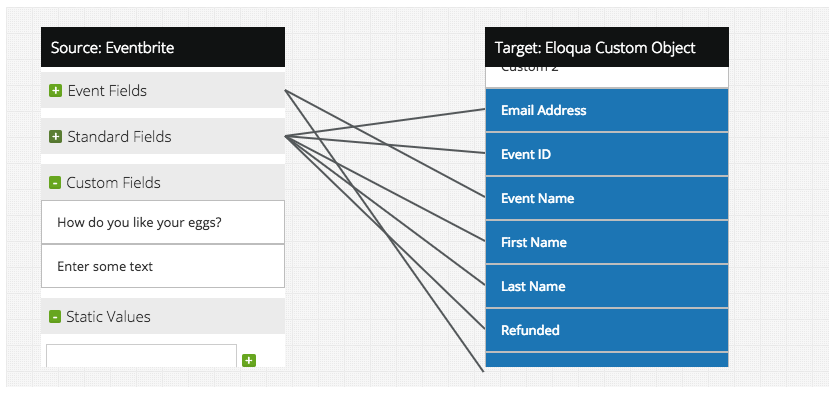
The Eventbrite feeder allows the following fields for Custom Object import:
- Event Fields - The following event fields are available:
- Currency
- Description
- End Date
- Event Name
- ID (Event ID)
- Password
- Start Date
- Status
- Standard Fields - The following event attendee standard fields are available:
- Attendee ID
- Event ID
- Checked In
- Cancelled
- Refunded
- First Name
- Last Name
- Billing Address 1
- Billing Address 2
- Billing City
- Billing State
- Billing Postal Code
- Billing Country
- Billing Region
- Refunded
- Custom Fields - Any event custom field (question) is available for mapping
- Static Values - You can add one or multiple static fields for mapping
Lastly, select your preferred “Update Rule” to be applied to the data imported from Eventbrite to the Custom Object.

Note: “Always Update Eloqua” is the default.
Click Continue to complete your app configuration. The Cloud Feeder will automatically enable when you activate the Campaign or Program.
Updated about 1 year ago
